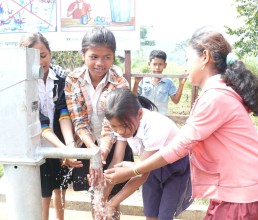Children's right to a clean, healthy and sustainable environment
1. South Africa | Green Start-Ups Create Jobs | Terre des Hommes Germany

Green start up projects in Africa. ©Tdh
Diepsloot is a densely populated suburb in the north of Johannesburg. More than 300,000 people live here and youth unemployment is over 50 percent. Terre des Hommes’ project helps young people to set up their own businesses with organic farming.
I can’t wait for someone to offer me a job.
Debra has vision, determination and the will to succeed: “I have to use my opportunities and create one for myself.”
Because the young single mother was unable to find a job despite her degrees in computer science and agriculture, she applied for a program run by Terre des Hommes´ partner organisation Afrika Tikkun. At the Tikkun center in Diepsloot, Debra not only learns how to prepare a bed, plant, water and fight pests, but also how to run a farm.
Debra is one of 60 young people between 18 und 25 years old, who were given the opportunity to start their own agrobusiness. The agricultural and business management training lasts one year. At the end of the course, those who wish to can farm on a 300 square meter plot of land of their own and apply what they have learned.
The Tikkun center in Diepsloot also includes a nursery, where the young farmers buy seeds and plants, and a packing house, where the distribution of products is organised. The start-ups also continue to receive marketing support.
She is optimistic:
If I start with one hectare of land and slowly increase it, I can achieve a lot. And with a job, I can help a lot of people.
The products produced through the program are already known for their organic quality and are increasingly appreciated in Diepsloot and the surrounding area. This is because fresh and healthy food is in short supply in the urban environment. Debra wants to set up her own business, supply people with high-quality food and create jobs – in line with Afrika Tikkun’s goals.
Learn more about the programmes run in Africa here (in German).
2. Cambodia | Clean Water and Non-Violent Education | Terre des Hommes Germany

Access to water in Cambodia. ©Tdh
In the province of Kampot in Cambodia, around 120 kilometers southwest of Phnom Penh, there is a lack of almost everything – including drinking water and sanitary facilities. The poor hygienic conditions often make children and adults ill and endanger their safety.
Terre des Hommes’ project partner COCD (Cambodian Organisation for Children and Development) has started to drill wells in 45 villages, build toilets and is helping people collect rainwater in large tanks.
Chim, who is nine years old, is happy: he no longer has to carry water for his family from the pond far outside the village. He also no longer has to worry about drowning like a boy from his neighborhood. And he now has more time to go to school and play.
Neighbor Morm Thorn is also happy: she was able to build a toilet with a small loan and technical assistance.
Before, we had to go into the forest outside the village to relieve ourselves. We were very afraid of snakes. And we were afraid of being watched. I was particularly worried about my daughters.
COCD trains local water management groups to maintain the wells, build toilet blocks and make joint democratic decisions. The women are particularly committed: 800 of them have organised themselves, save small amounts together and grant loans. Not just for building latrines, but also for growing vegetables or raising chickens. The first groups are already marketing their products together.
Life is getting a little easier in the villages and COCD is using the initial success to achieve the second important goal: violence in the families must be stopped. At the start of the project, 70 percent of adults and children thought that physical violence was a good educational method. Now only 12 percent still think so. In workshops, parents and teachers learned about children’s rights and discussed how they can live together in everyday life without violence.
Children and young people themselves are making a significant contribution to the change in opinion: they are involved in 20 clubs and campaigns for non-violent conflict resolution at home, at school and in the villages.
Learn more about the projects run in Cambodia here (in German).
